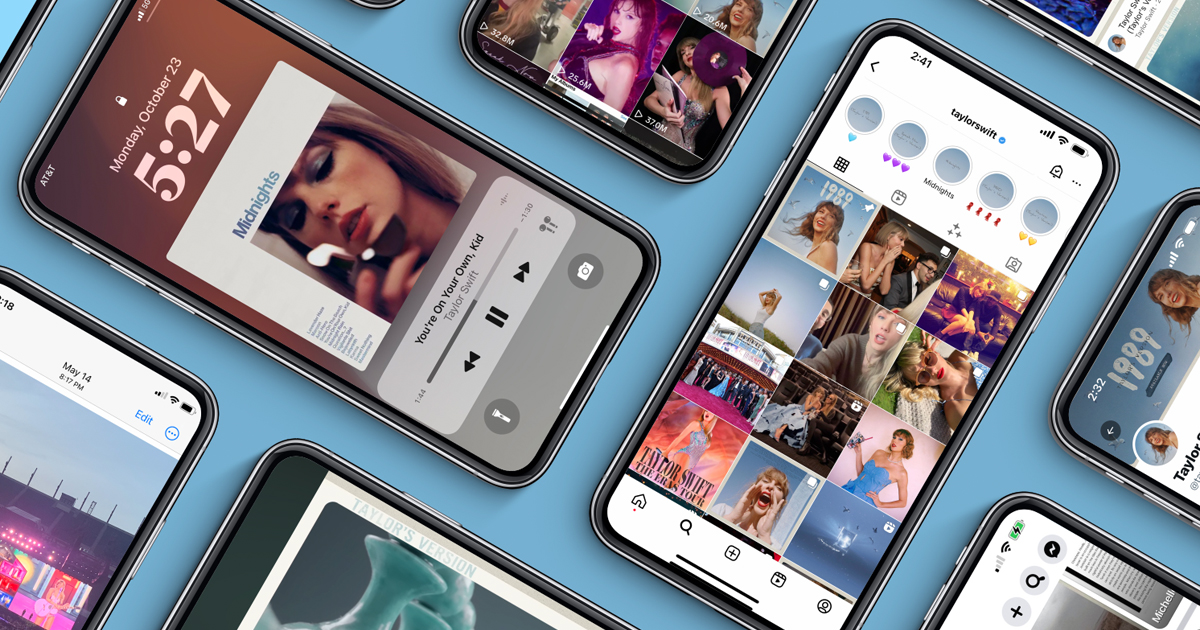A (Taylor) Swift Lesson in Personal Branding

Sunday Night Football flashes to a small street in New York City’s West Village. Suddenly, every brand is “X’s Version.” And if you go to the movie theater, you may hear a pop song over your Scorsese matinee.
It’s all part of what Associate Professor of Marketing Anjali Bal calls “the greatest show in entertainment.”
That show, of course, is pop star Taylor Swift, someone whose work, love life, whereabouts, and birth year are so ingrained in popular culture that it’s like she wants people to guess her passwords.
Her popularity defies pop culture trends, as interests have become more niche in the streaming era. Swift feels like one of the last dying breaths of monoculture, hoping to survive long enough to see the 2024 European leg of The Eras Tour.
So, as Swift herself would ask: Why do so many fade, but she’s still here?
It’s part musical evolution and talent, and part business acumen and personal brand masterclass.

Associate Professor of Marketing Krista Hill Cummings
“Personal branding is about highlighting one’s unique qualities, skills, and experiences to present a distinct value proposition,” says Associate Professor of Marketing Krista Hill Cummings. According to Hill Cummings, the main four elements of a personal brand are authenticity, consistency, clear value proposition, and visibility.
Bal sees personal branding as a networking tool that helps employers determine who they want to hire. “They want to know who you authentically are before they invest in you. If you can position yourself from a personal branding standpoint (in a way) that tells people who you are, it’s easier for (peers and employers) to find you. That increases the likelihood that you’ll find something rewarding and right for you.”
Your personal brand is every piece of messaging that reaches your targeted audience. Who better to learn personal branding from than the person with the largest audience, the mastermind herself.
Tell Your Authentic Story
An effective personal brand is one people believe in. For Swift, fans know what she’s feeling because it’s in the product.
“The brilliance of Taylor Swift is she’s written a song about every aspect of your life,” Bal says.
Her value proposition is personal, prolific storytelling, and she infuses that across music, social media, and wider culture. You don’t have to read your diary to present yourself authentically, but you do need to figure out how you want to relate to people and infuse it into your work and social media.
“If you can position yourself from a personal branding standpoint (in a way) that tells people who you are, it’s easier for (peers and employers) to find you. That increases the likelihood that you’ll find something rewarding and right for you.”
Anjali Bal, Associate Professor of Marketing
Be Consistent
“It’s vital to present a consistent image and tone across various platforms and interactions,” Hill Cummings says.
Part of that story is your visual aesthetics. In her Principles of Marketing class, Bal has students vision board their skill sets. Exercises like that, as well as personal branding workshops from the Hoffman Family Undergraduate Center for Career Development, can help you develop cohesion across items such as your headshot, social profiles, and resume.

Associate Professor of Marketing Anjali Bal
It’s also about messaging. The 2020 documentary Miss Americana includes a scene where Swift is upset that she didn’t speak out during the 2016 election, something she received public criticism for. “Consumers punish when you’re inauthentic,” Bal says. “One thing we see with entrepreneurial leadership is listening, being involved, and being who we say we are. Personal branding is the fastest way to do that.”
Following that moment, Swift has used her Instagram as a platform to advocate for social causes and a voter registration tool, helping register 35,000 new voters in 2023 for National Voter Registration Day, according to Axios.
Figure out what matters to you and put it (and keep it) at the forefront of your work, social media, and networking conversations.
Know Your Value

Entrepreneurial leaders of all kinds can learn how to market themselves from Taylor Swift’s personal brand. (Photography: Jamie Lamor Thompson/Shutterstock.com)
Learning personal branding is learning about yourself and why your work matters. Since 2021, Swift has been releasing new versions of her older albums, as a response to the sale of her masters’ catalog. Her public reclamation and re-examination of her work is a business opportunity and a chance to re-engage fans with early career songs.
“She fought publicly about the rights to her stuff, and with The Eras Tour and (the re-recordings), she reclaimed those songs in public opinion,” Bal says. “Now, all the fans are with her.”
It’s a reminder that everyone brings something to the table, regardless of industry or skill level. Swift understood where her skills stood in her chosen market and took a business risk that paid off.
Be Visible in Your Network
Part of Swift’s longevity in the music industry is how she moves through genres. When she wanted to go pop, she reached out to Max Martin. When she wanted to try indie, she called Aaron Dessner. Both of them became main collaborators on two of her most acclaimed albums, 1989 and Folklore.
You aren’t boxed into what you’ve done. Entrepreneurial leaders pivot with confidence. Are you interested in breaking into a new industry? Grab that elevator pitch and start selling yourself to whoever will listen. The more you can showcase your abilities, value, and consistent message, the more willing employers are to take a chance on you.
Ultimately, your personal brand is your story come to life, whether that’s on a stadium stage, a movie screen, or a LinkedIn profile. “A personal brand’s story can showcase one’s journey, values, challenges overcome, and aspirations,” Hill Cummings says. “It all creates a compelling narrative that resonates with the audience.”




